Battle of the Three Emperors
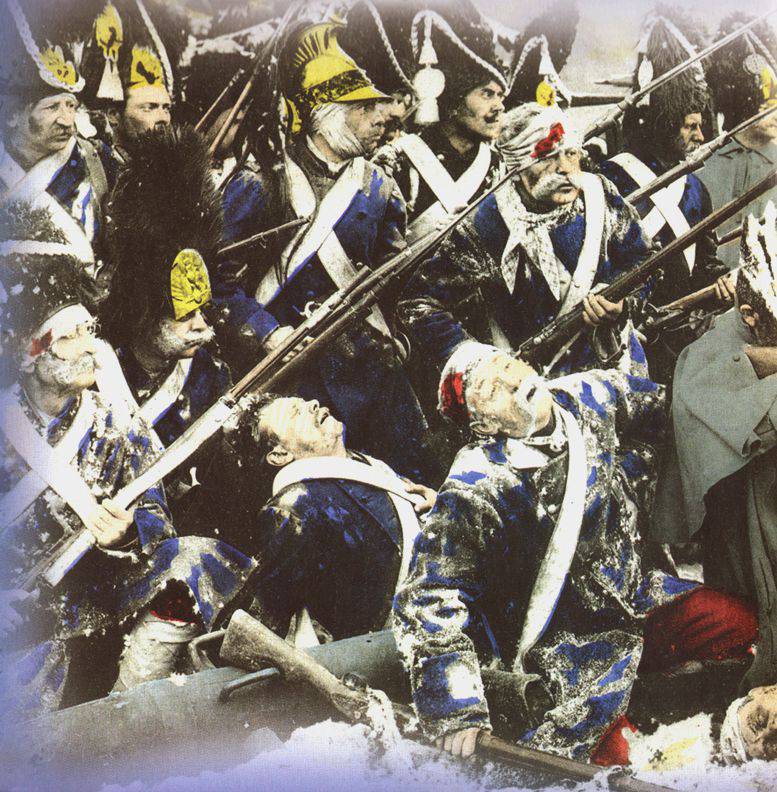
17 (29) November 1805. Allied forces left the big Olmütz road and, getting stuck in the autumn mud, moved around the Brunn through Austerlitz. The troops moved slowly, waiting for the supply of supplies, and not knowing where the enemy was. It was surprising and pointed to the bad organization of the Allies, because the Russian-Austrian army was on its territory and did not have good intelligence and agents. Therefore, the troops moved almost by touch, bad country roads. For three days - before November 19 (December 1) - they traveled just 26 kilometers, moving about at stops in search of food and fuel.
This allowed Napoleon to easily unravel the Allied plan - to attack his right wing. Wanting to further convince the enemy of his hesitations and uncertainty, Napoleon ordered Marshal Soult to leave Pratzen Heights in a hurry. The French emperor concentrated the army between Austerlitz and Brunn. This even more inspired the allies, because the French avant-garde retreated for several days, not trying to give battle. Napoleon was clearly preparing to defend himself. On November 19 (December 1), the Allied Army, having completed an 60-kilometer march in four days, took up positions on the Pratzen Heights - Kovovalits line. Watching this movement, the French emperor applauded and exclaimed: “They fell into the trap! They are doomed! Tomorrow, by the end of the day, this army will be destroyed! ”
Napoleon, well aware of the enemy’s spies at the Allied headquarters, took up a position east of Brunn behind the Goldbach and Bozenitsky streams. The French emperor decided to strike his main blow at the center of the enemy on Pratzen Heights, which, with the departure of the Allied left wing, would be weakened. With this maneuver, Napoleon intended to cut the Russian-Austrian army in two, go to the flank and rear of the Allied strike force and destroy them separately. To keep the enemy in the area of the Telnits-Sokolnits, that is, the main strike of the three Russian columns, Napoleon deployed only one brigade from the Legrand division, which Davout troops were supposed to support, and to ensure the left flank, a 18-gun battery flanking approaches to Bozenitsky stream. By the time the number of French army reached 74 thousand people (60 thousand infantry and 14 thousand cavalry) with 250 guns.
Thus, in contrast to the Weyrother plan, built without taking into account the actual situation and on the theoretical position that the enemy will be passive, the French commander put forward an active plan of action in front of his overwhelming enemy. Napoleon was going to attack the enemy, and not to wait until he was crushed and chased.
The French emperor spent two days on the eve of the battle on horseback and on foot, explored the field of future battle. He studied it so thoroughly, was so well oriented in it that, according to Savary, Austerlitz's prefield was as familiar to Napoleon as the neighborhood of Paris. The emperor spent the evening hours among the soldiers: he sat down by the fires, exchanged jokes, recognized old veteran acquaintances; Everywhere, where Napoleon appeared, joyful revival, cheerfulness, confidence in a victory was born. November 19 (December 1) Napoleon gathered the commanders of the corps and explained his plan. The center of the French troops was under the command of Marshal Soult, the left wing was led by marshals Lahn and Bernadot, the right flank, somewhat pulled back, was under the command of Marshal Davout. Guard was in reserve.
The Allies followed Weyrother's plan. The reinforced strike force on the left flank of the three columns, under the command of generals D.S. Dokhturov, A.F. Langeron and I.Ya. Przhibyshevsky, was supposed to break through the French right wing between the villages of Telnitz and Sokolnits, followed by a turn to the north; the fourth column of the Austrian General I. Kolovrat and General M. A. Miloradovich was to advance through Pratzen Heights on Kobelnits; The fifth column, consisting of the Austrian cavalry of General I. Liechtenstein, and the vanguard of the allied army under the command of General P. I. Bagration, had the task of chaining the enemy and providing a detour of the main forces. The Russian Guard under the command of Grand Duke Konstantin Pavlovich made a reserve. The plan was good in theory, but did not foresee a possible counter-offensive of the enemy. In addition, the Allies did not know about the size of Napoleon’s army, they assumed that the French were no more than 40-50 thousand people.
Thus, the Allied command overestimated its strength, underestimated the strength and intentions of the enemy. The left wing of the Allied forces consisted of three columns under the general command of General Buksgeven. Russian-Austrian troops under the command of Kutuzov served as a center, Bagration commanded the right wing. At the time of the battle, the Allies had more than 84,5 thousand people (67,7 thousand - infantry and 16,8 thousand - cavalry) with 330 guns.
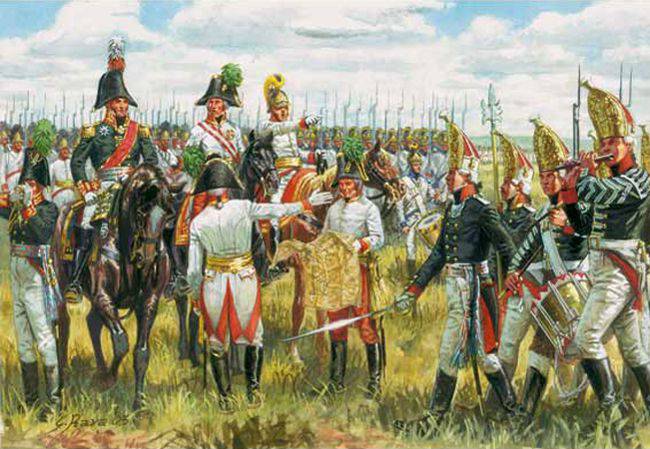
Austro-Russian headquarters in 1805 year. Giuseppe Rava
Mikhail Kutuzov again offered to refrain from a decisive battle and first clarify the situation, since the Russian-Austrian command had no reliable information about the forces and disposition of Napoleon’s army. But this proposal was again rejected by the emperor Alexander and the crowd of his arrogant and irresponsible advisers. The Russian Tsar wanted the laurels of the winner of Napoleon. Counselors wanted honors and awards. The Austrians were the winners in any outcome of the battle, since the brunt of the battle fell on the Russian army. Weyrother's mediocre plan went into action. When Weirother on the night of November 20 (December 2) read the order to the chiefs of the convocations convened at headquarters, when asked by one of them about the events in case the French attacked the Allied forces on Pratzen Heights, the quartermaster general replied: "This case is not expected" .
The Allies began to rest, occupying the Pratzen Heights. It was mostly an open place, dominated by heights, steeply descending to the creek Goldbach, whose eastern shores were inconvenient to cross. The most suitable places for crossing the stream were located near the villages of Belanets, Sokolpits and Telyonits, which lay in deep beams. South of them were the lakes Meniz and Zachan, already covered with weak ice. At dawn, the troops lined up. The French chose a deep order of battle, the allies on the orders of the headquarters used a linear battle order.
Battle
20 November (2 December) 1805. The battle of the three emperors began. At dawn, at the beginning of 8, the Allied forces launched an offensive on the right flank of the French army, bypassing the columns of the generals of Dokhturov, Lanzheron and Przybyshevsky, built in two lines each. The fourth column of Kolovrat-Miloradovich stood on the Pratzen Heights. The fifth column of Liechtenstein - the Austrian cavalry - and the vanguard of the allied army under the command of Bagration covered the right flank of the allied army. Russian Guard was located behind the heights.
The fighting began on the left flank of the Russian-Austrian army, where Kinmeier’s avant-garde attacked the French and entered the battle for the villages of Sokolnits and Telenitz. Villages have repeatedly passed from hand to hand. Our troops took up as Kinmayer strengthened with parts of the Dokhturov column, and the French brigade counterattacked after approaching parts of the Davout corps. In this battle, the French were clearly in the minority, but they managed to hold on, since the Allies could not deliver one powerful blow and did not have enough space to turn around with all their might, which reduced their numerical superiority to nothing.
After the 9 clock, the Tarnits was taken, and by the 11 clock, the Langeron's convoy managed to capture Sokolnits, and the Przybyshevsky's column captured the Castle. Dawu's corps, under the powerful pressure of the Allies, somewhat withdrew. However, the French right flank bound the strike arm of the Allied Army - more than 40 thousand soldiers, which contributed to the implementation of Napoleon's plan. Moreover, Alexander I ordered the column of Kolovrat-Miloradovich to leave the Pratzen heights and follow to the main forces. “If the Russians leave the Pratzen Heights for a detour to the right, they will perish irretrievably ...” said Napoleon to his marshals during the battle. This was foreseen by Kutuzov, who, contrary to the orders of the headquarters, continued to maintain heights. Dissatisfied with Kutuzov, Alexander rode up on Pratzen Heights, ordered to leave them and go on to join with Buxgevden.
Cuirassiers before the attack. Austerlitz. Jean-Louis Ernest Mesonier
This miscalculation of the Allies took advantage of Napoleon. The French emperor at that time stood at a height north-west of the village of Shlyapanits, watched the actions of the Russians and waited for them to free their heights. The emperor was supposed to sign the three corps — Murat, Soult, and Bernadotte. Marshals were nervous and hurried Napoleon. But he was aware that the decisive moment had not yet come, and the allies could still correct the first mistake: “Gentlemen, when the enemy makes a false move, we should in no way interrupt him. Let's wait for another 20 minutes. ” And he waited for this moment.
The French attack was fatal for the Allies. The case of Soult attacked the heights left by the enemy and the flank of the Kolovrat column. The blow to the central position of the allies was overwhelming, the allies were taken by surprise. The French emerged from the fog and rushed to Pracen under the crack of the drums. The French climbed the slope and were on top. Climbing up and being within the reach of the enemy, they fired a volley and rushed into a bayonet attack. The Allied Center mixed up, the cavalry mixed up with the infantry, the troops interfered with each other and began to retreat.
Recovering himself, Kolovrat, supported on the right by Lichtenshein's cavalry and on the left by three regiments from the Langeron column, tried to counterattack, stop the enemy and regain the heights. Russian troops went on the attack, but the French constantly threw new reserves into battle and intensified the onslaught. Two-thirds of Napoleon’s army, about 15, thousand soldiers, were operating against this site of 50 thousand Russians and Austrians.
At the same time, Napoleon threw the Lanna (Lan) corps and Murat's cavalry into the junction of the center and right flank. Attacked and Bernadot corps. The battle entered the column of Bagration. Now the battle was boiling all along the line, both sides suffered heavy losses. The French suffered particularly from the artillery fire of the Russian artillery. Finally, under the fierce onslaught of the French cavalry, the Russians could not stand it and began to retreat. Under the continuous pressure of the Bernadot, Murat and Lanna corps, the right flank of the Allied Army began to retreat, which broke the Allied line.
The small Russian guard bravely tried to stop the onslaught of the corps of Bernadotte and Murat. The masses of the French surrounded them on all sides, but the guard did not flinch and fought furiously, not just rushing into bayonet attacks. At the cost of tremendous efforts, the Russian Guard broke through the advanced French chains, but was then stopped by enemy reserves. The attack of the Guards infantry was supported by two squadrons of horse guards. The Russians discarded the Napoleonic cavalry, flew into the battalion of the 4 th regiment and took away the badge of his military distinction - the eagle. The French soldiers trembled, but it was only a local success. The desperate efforts of the Russian Guard, which on that day covered itself with glory, could not change the overall picture. Napoleon's commanding genius was head and shoulders above the headquarters of the allied army, and the heroism of the Russian soldiers could not turn the tide. Napoleon threw the Mamluks into battle, and they completed the rout of the Russian Guard. Russian horse guards were almost completely exterminated. The Allied Center was completely defeated and retreated.
The feat of the Horse regiment in the battle of Austerlitz in 1805 year. Bogdan (Gottfried) Villevalde
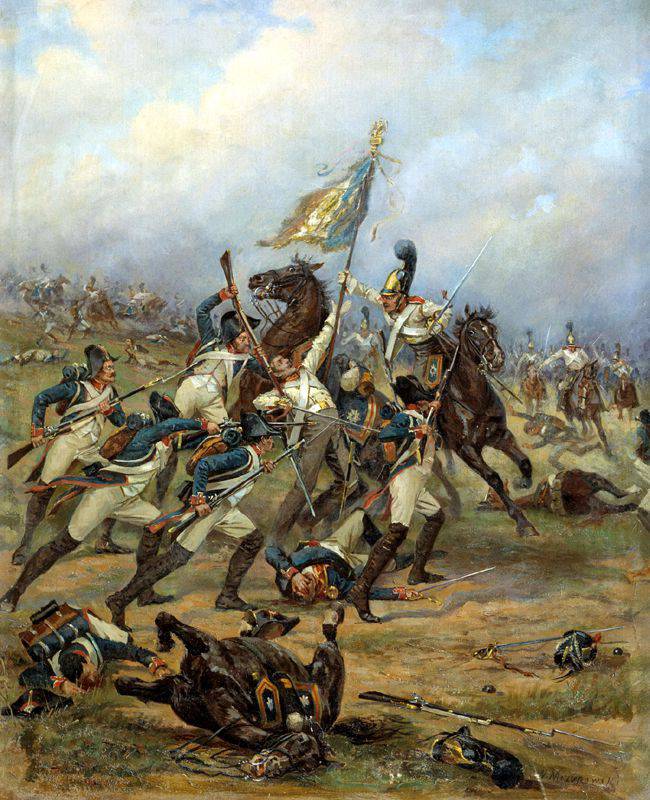
Fight for the banner (feat of the Horse Guards at Austerlitz). Victor Mazurovsky. The picture shows the first combat battle of the Life Guards Horse Regiment and the capture of the French eagle in the battle of Austerlitz 2 December 1805
Having deployed the 42 guns on the heights, the French attacked the rear and flank of the bypassing columns with the forces of the Soult and Bernadot corps. In the counteroffensive, Douvou Corps passed. In 14 hours, the Imperial Guard and the grenadiers of Marshal Oudinot were ordered to move to the village of Telnitz in order to inflict a final defeat on the left flank of the allied army.
After breaking through the front, Kutuzov, recognizing the position of the army to be desperate, sent an order to Buksgeven to retreat. However, he did not understand the situation and watching the weak forces of the French army in front of him on the right bank of the Goldbach did not obey the order. He trampled on the spot, not moving forward and not trying to inflict a flank counterattack on Soult’s corps operating from the side of Pratzen.
Thus, the commander of the left wing of the Russian troops, Buxgevden, having 29 infantry battalions and 22 squadrons of cavalry, instead of organizing a flank counterattack and helping the dying Russian army, almost all the time the battle was carried around the secondary battlefield, where he was kept for hours by a small French squad. And then the time came for the left flank of the allied army.
Meanwhile, the French divisions of St. Iller and Legrand, which acted in the direction of Sokolnitz, attacked the right column of Przybyshevsky. Hastily advanced against a threatening flank attack, several Russian battalions were immediately swept away by superior enemy forces. The rest of them tried to retreat west through Goldbach, but came under the crossfire of Davout and Seth-Iler artillery. The column was defeated: part destroyed, part taken prisoner. However, this battle allowed the Langeron convoy to retreat through the Waders.
Only after that, being cut off from the rest of the army, Buxhoveden realized his mistake and gave the order to retreat. The bypassing columns were forced to retreat, making their way through the French who had left them to the rear, to use the defile between the Monits and Zachan lakes and the lake Dam to leave. Zaschan, bearing heavy losses. The forward nine battalions of Dokhturov and Kinmayer, which remained east of the creek, retreated to Aouzd, but the Vandam division had already reached the village and threw the Russians to the frozen Zachan lake. The Russians had to make their way along the ice and along the dam between the Zachansky and Moenitz lakes. General Dokhturov personally led a group of brave men, who covered the retreat, rushing to bayonet attacks on the French.
The right wing of the allied army under the command of Bagration, who was clearly and coolly controlling his troops, continued to fight. Napoleon sent against him to help his left wing and Murat's cavalry. Only then Bagration departed. By evening, the battle subsided. The French did not develop success and did not organize the persecution with the aim of the complete destruction of the Allied army. The weak pursuit of the French cavalry made it possible for the allies to gather at Gding.
Battle results
The battle was lost by the Russian-Austrian army, an attempt to defeat Napoleon ended in disaster. Under Austerlitz, the Allies lost 27 thousand people (of which 21 thousand - Russian), of which 10 thousand killed and 17 thousand prisoners, 155 guns, 30 banners. The loss of the French amounted to 12 thousand killed and wounded.
Emperors Alexander and Franz fled from the battlefield long before the end of the battle. Almost all of Alexander's brilliant retinue ran away and joined him only at night and even the next morning. The Austrian emperor was so shocked that he decided to ask Napoleon for peace. Kutuzov himself was wounded by a fragment in the cheek, and barely escaped from captivity, and also lost his son-in-law, Count Tizengausen. Alexander, realizing his guilt, publicly did not blame Kutuzov, but he never forgave him for defeat, believing that Kutuzov deliberately framed him.
The next day, in all parts of the French army, Napoleon’s order was read: “Soldiers, I am pleased with you: on the day of Austerlitz you accomplished everything I expected from your courage. You have decorated your eagles with undying glory. The army in 100 of thousands of people under the command of the Russian and Austrian emperors was cut and scattered at less than four hours. Those who escaped your sword, sunk in the lakes ... ". True, as later studies by historians have shown, this was a great exaggeration, with this retreat drowned in ponds and died from artillery fire from 800 to 1000 people.
Militarily, Austerlitz is characterized by the achievement of complete victory through a single simple maneuver, carried out at an unmistakably chosen point in time. At the same time, Napoleon’s ability to create an advantage in decisive forces was manifested. However, no less important in the success of the French army is the lack of talent of the high command of the allied army, which has exposed the army to the enemy's blow. Under Austerlitz, the depravity of the outdated linear military system was re-opened, followed in Austria and assiduously implanted in Russia. The so-called “maneuverable strategy” and linear tactics showed their complete inconsistency in the face of Napoleon’s new strategy and tactics. In organizational terms, the allies also conceded to the French: in contrast to the French corps and divisions, the allies made up columns of unrelated parts. A big role was played by the lack of a unified command. With the start of the battle, the columns were left to their own devices, and the general leadership of the Russian-Austrian troops was lost. Kutuzov, following with the column of Kolovrat and not feeling power behind him, was in fact only the incomplete leader of this column. Buksgevden, obeying Alexander, did not fulfill Kutuzov’s orders to withdraw. And the rate of the two monarchs, where the “brain” of the operation was assembled, ceased to exist at the very first failure. Alexander and Franz and their retinues fled in disarray from the battlefield, fearing to be captured.
It should be noted that the defeat in the war forced the Austrians to continue military reforms, bringing the army in line with the new elements. For the next campaign, Austria already had a strong army.
Napoleon was especially proud of Austerlitz. He proved himself to be a diplomat, deceiving and luring the enemy, as strategists and commanders, defeating the superior forces of the allies in a decisive battle. Austerlitz is the triumph of Napoleon’s diplomatic and military genius. With this one victory he won the whole campaign, subjecting his influence to the whole of Central Europe. The glory of the French Empire and the invincible “Great Army” increased even more.
Austerlitz - one of the most brutal defeats of the Russian army in the XIX century. For the first time since the time of Peter the Great, the Russian army lost the general battle. And, nevertheless, assessing this campaign afterwards, Napoleon said: "The Russian army of 1805 was the best of all ever put up against me." Indeed, although Russian society was shocked by defeat, but this battle did not cause discouragement in the Russian army.
Defeat of the third coalition
The defeat in the general battle ended the Austrian Empire. The Austrians refused to continue the struggle, although there was still an entire army of the Archduke Charles, the Russian army retreated in order and after rest and replenishment could continue the struggle, Russian reinforcements approached, and there was hope for the Prussian army.
On December 4, Emperor Franz himself came to Napoleon’s camp and asked for a truce. Napoleon received the emperor Franz politely, but above all he demanded that the remnants of the Russian army immediately withdraw from the Austrian empire, and he himself appointed certain stages to them. He said that peace talks would be conducted only with Vienna. Franz, of course, agreed without question. The third coalition of European powers ended its existence.
Austria was forced to conclude 26 December (January 7) in Presburg (Bratislava) difficult for her peace treaty with France. Austria was inferior to Napoleon, as the king of Italy, the Venetian region, Istria (except Trieste) and Dalmatia, and recognized all French conquests in Italy. In addition, Austria also lost all of its possessions to the west of Carinthia, which came under the authority of Napoleon’s main allies in the empire: Bavaria, Württemberg and Baden. Moreover, the emperor Franz II recognized the titles of kings for the monarchs of Bavaria and Württemberg, which brought them out of the control of the institutions of the Holy Roman Empire. This led to the end of Austrian dominance in the Holy Roman Empire and contributed to its dissolution in 1806. In general, Austria lost one sixth of the population (4 million from 24) and one seventh of government revenue. Austria also paid a contribution to France in the amount of 40 million florins.
Russia has withdrawn troops into its territory. Planted in Naples in November 1805, the Anglo-Russian landing force was returned to Malta and Corfu. The corps of General Tolstoy, landed in Tralsunda (Germany), returned to Russia. At the same time, Russia abandoned the world, continued hostile actions against Napoleon as part of the Fourth Anti-French Coalition, also organized with the active participation of England.
Prussia immediately abandoned the idea of war with France. On December 7 a frightened Prussian envoy Count Gaugwitz appeared at Napoleon’s headquarters, and without a word about his commission (an ultimatum, after which Prussia was to declare war on France), congratulated on his victory at Austerlitz. “This is a compliment,” Napoleon replied dryly, “whose address has changed thanks to fate.” Napoleon first shouted, said he understood the whole trick of Prussia, but then agreed to forget and forgive, but with the condition: Prussia must enter into an alliance with France. The terms of the union were as follows: Prussia gave Bavaria its southern possession - Anspach; Prussia gives France its possessions - the principality of Neuchâtel and Kleve, with the city of Wesel; and Napoleon gave Prussia occupied by his troops back in 1803 of Hanover, which belonged to the English king. As a result, Prussia entered into an alliance with France, that is, declares war on England. Gaugvits agreed on everything. Prussia king Frederick William - too, especially since he expected the worst. However, this agreement was insulting to Prussia and soon became the pretext for a new war.
Napoleon’s irreconcilable enemy, British Prime Minister William Pitt, broke news when Austerlitz arrived. The society accused him of disastrous illusions, the opposition demanded his resignation, screaming about the shame that falls on England, about the English gold millions that were thrown to the wind, to the mediocre coalition. Pitt could not bear the nervous shock, fell ill and soon died. The new government of England decided to go to the world with France. True peace and failed to conclude, already in 1806, the war continued.
Napoleon became the owner of a large part of Europe. Austria was defeated. Prussia bowed before him. To France and Italy stretched endless carts with loot taken in the Austrian Empire. Some guns were captured in battles and taken in the arsenals of 2 thousands, more 100 thousands of guns, etc. France signed a close defensive and offensive alliance with Bavaria, Württemberg and Baden.
In addition, after King Ferdinand of Naples and his wife Carolina in October 1805, seduced after the Battle of Trafalgar with the thought that Napoleon would be defeated this time, entered into an alliance with England and Russia, decided to remove the Neapolitan Bourbons dynasty. After Austerlitz, the Bourbons had to pay brutally. “The Bourbons ceased to reign in Naples,” the French emperor said and ordered the French troops to occupy the whole kingdom immediately. Bourbons fled to the island of Sicily, under the protection of the British fleet. Napoleon soon appointed his brother Joseph as king of the Neapolitan. On the continental part of the Kingdom of Naples, a satellite state of France with the same name was formed. The island part of the kingdom, that is, Sicily retained independence.
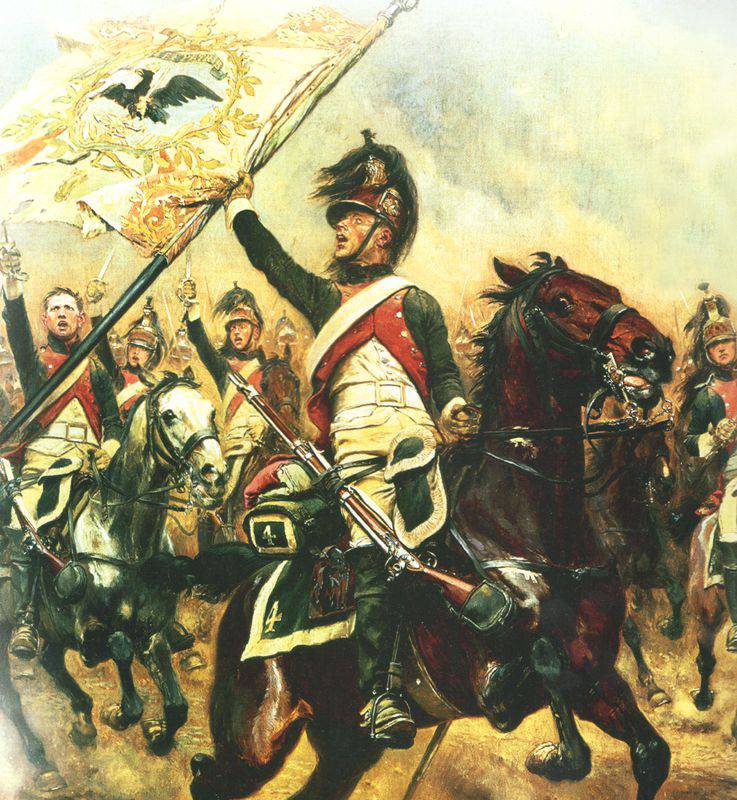
Capture by the French of the Austrian standard at Austerlitz. Unknown artist
Sources:
Beshanov V. Sixty battles of Napoleon. Minsk, 2000.
Jurien de la Gravière. War at sea: The Nelson Era. SPb., 1851 // http://militera.lib.ru/h/graviere/index.html.
Manfred A Z. Napoleon. M., 2002.
Mikhailovsky-Danilevsky A.I. Description of the first war of Emperor Alexander with Napoleon in 1805 year. SPb., 1844 // http://www.runivers.ru/lib/book3125/9804/.
Sokolov O.V. Napoleon's Army. SPb., 1999 // http://militera.lib.ru/h/sokolov_ov02/index.html.
Tarle E.V. Napoleon. M., 1939 // http://militera.lib.ru/bio/tarle1/index.html.
Battle of Trafalgar: 200 years // New and new story. No. 5, 2005.
- Alexander Samsonov
- War of the Third Coalition
England vs Russia. Drawing into war with france
England vs Russia. Getting involved in a war with France. Part of 2
"I won the battle with some marches." How Napoleon defeated the III anti-French coalition
The catastrophe of the Austrian army near Ulm
How England became the "mistress of the seas"
Trafalgar defeat
Ulm-Olmutsky march maneuver Kutuzov
"Kremskoy massacre"
How the "squad of heroes" of Bagration saved the Russian army
Battle of Caldiero
How the self-confidence of Emperor Alexander and the duplicity of the Austrians led to the defeat at Austerlitz
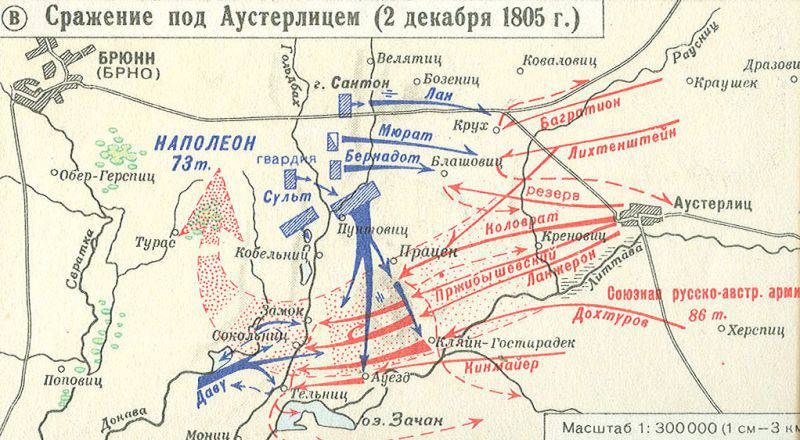
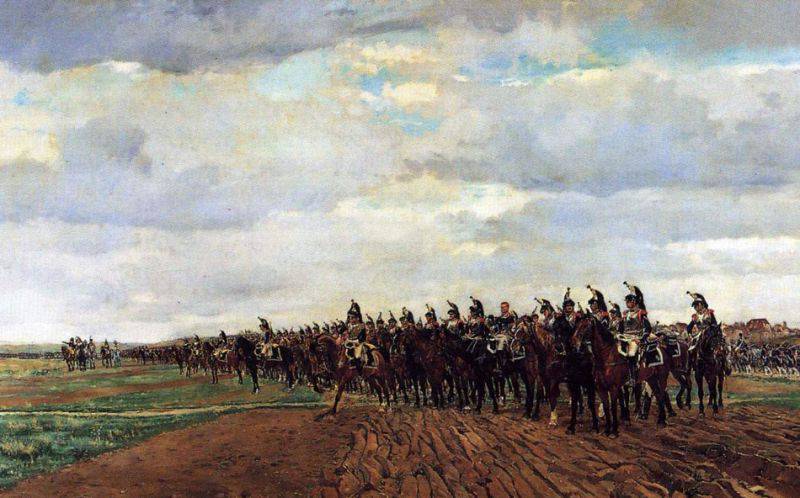
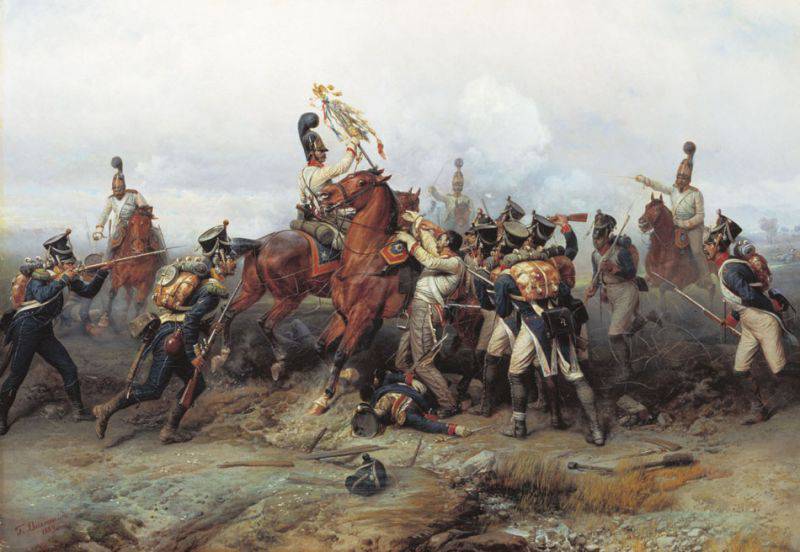
Information